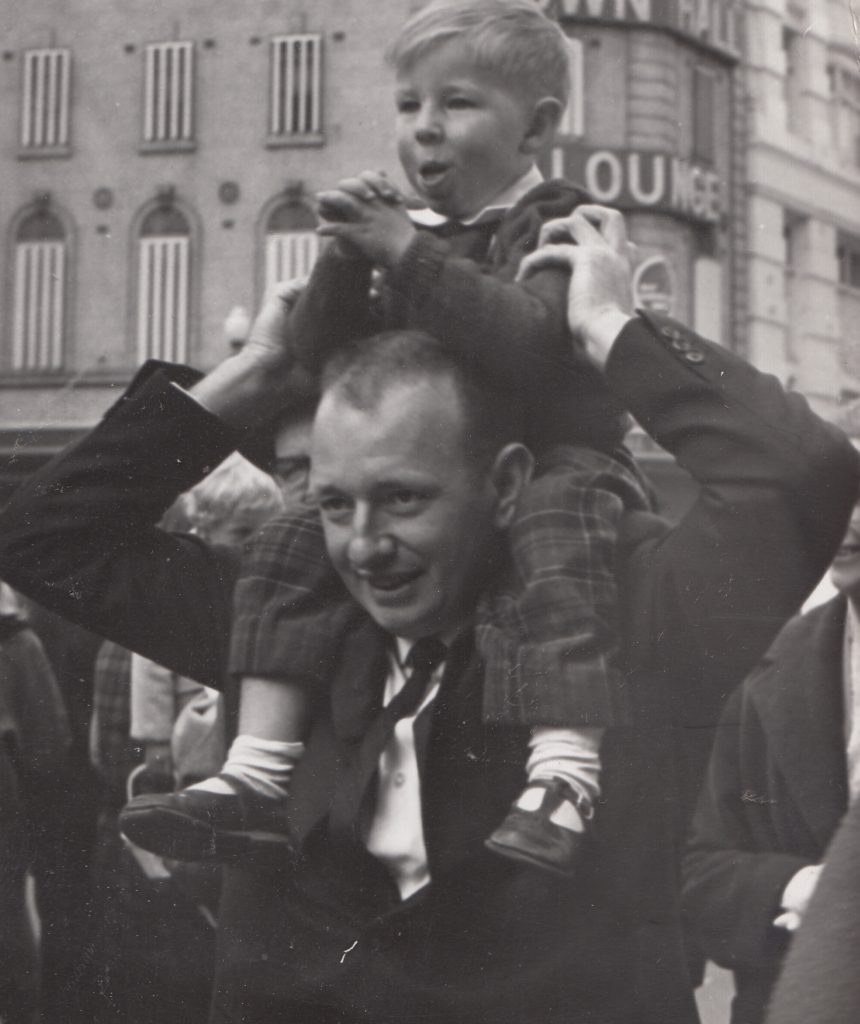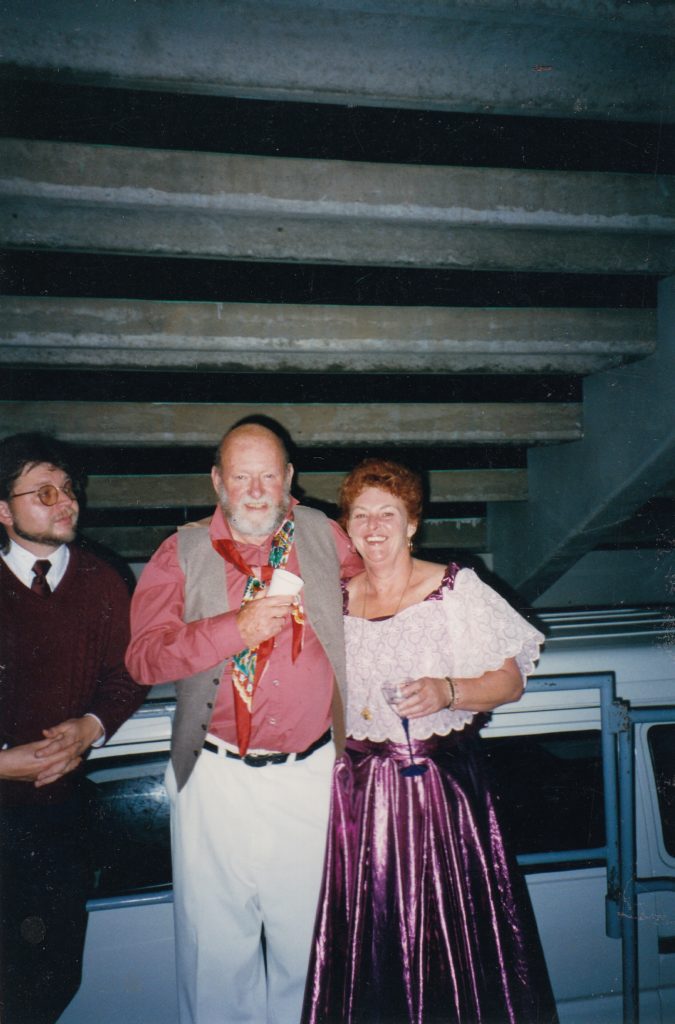Vale Brian Dunnett – a Railway Cultural Treasure
Roger Jowett, with contributions from Pam and Tony Hawkins and Beverly Symons
This piece predominantly reflects the tribute written by Roger Jowett, former National Secretary of the Rail, Tram and Bus Union, and published in the Railway Digest, October 2016. As now published in Hummer, it also includes some material prepared by Pam and Tony Hawkins and Beverly Symons, friends and comrades of Brian’s for more than 50 years.
Brian Dunnett, a second-generation railway worker, recently died at the age of 81. Brian spent his working life in the NSW rail industry as an electrician at the Eveleigh Locomotive Workshops and the Chullora Railway Workshops.
He was a socialist and a shop steward, and gave a life time of commitment to improving the lives of working people, blended with a passion for the railway industry and the workers who are its backbone.
Brian was a political and trade union activist for well over 50 years, from his early working life at the Chullora Railway Workshops, where he was a shop steward for the Electrical Trades Union, and later at the Eveleigh Workshops. He was a leading member of the Eureka Youth League in the 1950s-60s and for more than 30 years, a member of the Communist Party of Australia. He participated in the SEARCH Foundation from its formation.
Brian was always a fighter for social justice and human rights. He was opposed to corruption of any kind. He was involved in many demonstrations, particularly against the Vietnam War, and conscription. He had a strong interest in international solidarity and was particularly concerned with the mass killings of members of the PKI in Indonesia under the Sukarno Regime in 1965 and 1966.
One of Brian’s proudest achievements was gaining a Post-Graduate Diploma from Ku-ring-gai College of Advanced Education (later University of Technology, Sydney) while still working on the railways – further evidence of his perseverance, thoughtfulness and ability.
He had a long involvement in the folk music scene and participated in many Folk Music Festivals in Canberra and elsewhere.
Brian had a vision that the amnesia in which working class struggles and achievements are forgotten, downgraded or erased should be challenged.
Brian’s framework was a deep respect for and understanding of his fellow workers, welded from his own experiences as a shop steward and the working environment of the various railway workshops where he worked on steam and diesel locomotives.
The railway workshops were noisy, dirty, and dangerous workplaces and often had poor amenities.
Railway shop committees had a tradition of going beyond the traditional industrial agenda. In this environment Brian saw the opportunity to expand rail workers’ horizons.
In the 1940s, railway workshop workers had won the right to have an extended lunch hour each month to have a cultural presentation.
Following a chance meeting with a theatre director, Brian saw an opportunity to develop a play in situ at the Chullora workshops. The play Loco by Sideshow Theatre was developed in 1983 using the experiences of workers on the job to fashion and direct the development of the play. This era for the railway workshops was one of great uncertainty about security of employment and the threat of contracting out.
In an interview given about the process of developing the play, Brian made the crucial observation that the actors should not be providing readymade solutions, but the material should be presented in such a way that workers could draw their own conclusions. The play was successful and was performed at a number of Sydney venues and toured interstate
The Loco play and the development of the Trains of Treasure Exhibition in 1985 came from the experiences and everyday realities of workers in the railway industry. It was driven from the shop floor and this is what makes it unique.
Both Loco and the Trains of Treasure Exhibition were facilitated by grants from the Australia Council Arts and Working Life program. The Exhibition was developed by the Combined Railway Unions Cultural Committee of which Brian was a driving force.
The Trains of Treasure Exhibition consisted originally of 25 panels. Each depicted an aspect of railway culture through song, verse or significant event.
Railways in many countries have been incubators of national cultural characteristics, none more so than in Australia, where railways were the steel ribbons which connected communities and their evolution and development was depicted in song and verse.
The exhibition panels involve a rich tapestry of working class life which has been captured and preserved.
Their diversity ranges from Henry Lawson’s poem “Second Class Wait Here” to verse put together by rail workers and included in union magazines and shop committee publications. It includes the more contemporaneous, such as The Ballad of Janet Oakden, celebrating the woman who fought to become the first woman train driver in Australia, and The Fatal Train, a poem concerning rail safety epitomised by the Granville and Waterfall train accidents.
A further five panels were added to the exhibition in 2005 as part of the celebration of 150 years of railways in NSW.
The Loco play, the development of the Trains of Treasure Exhibition and the production of the Trains of Treasure CD of railway songs and verse were the result of countless hours spent in tracking down source material. These materials can be accessed at www.railwaystory.com
As with all such endeavours, these were the product of the collaborative work of many people. In the notes to Loco over 100 people are mentioned.
Of particular note has been the collaboration between Brian and Mark Gregory in the assembling, collation and preparation of a railway song book. This project has been an exemplar of Brian’s determination, pursued over a number of years with more than its share of obstacles.
The amount of time spent in translating ideas into a presentable or finished product was prodigious and, with the networking, administrative work and persuasion required, formidable. A universal comment made by everyone who worked with Brian was that he was one of the most persistent and dogged characters one is ever likely to meet.
Brian was a veritable Catherine Wheel of ideas which were transformed into events. There were the railway film festival at Eveleigh Locomotive Workshops, the railway song and poem competitions and the Green Train run as a part of the Illawarra folk festival. These and other projects were vehicles for unions and unionists to engage with the community through cultural activities of song, poem, verse, short story and film.
Brian was never one, even at the age of 81 and in deteriorating health, not to get involved and express strong opinions and involvement about a variety of projects.
These included the Unions NSW Centenary Celebration of the 1917 Great Strike and the ongoing struggle, following the sale of the Australian Technology Park including the Eveleigh Locomotive workshops to the property developer Mirvac, to present and preserve the considerable social and labour history associated with one of the most important heritage industrial sites in Australia and internationally.

